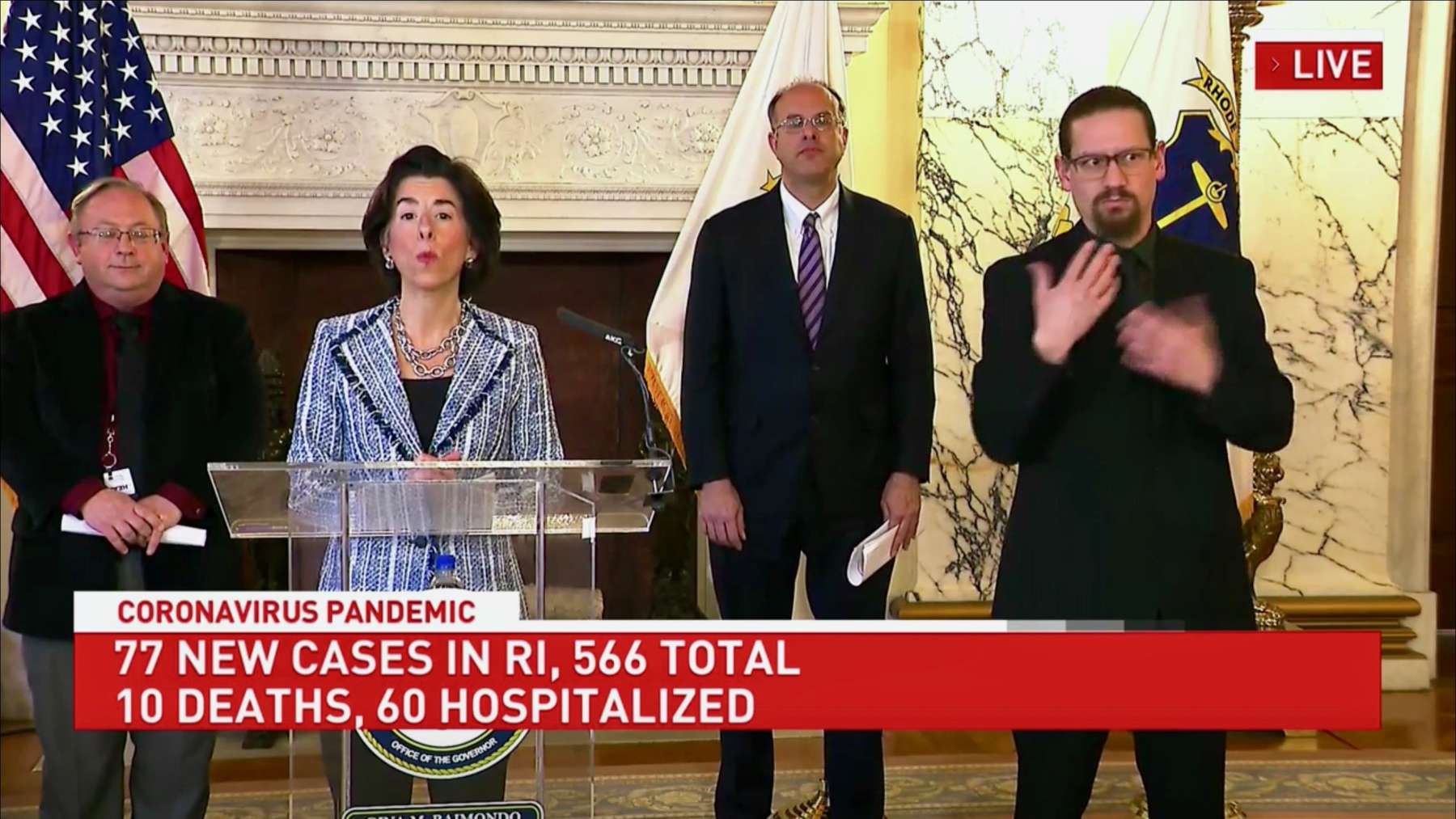Low-wage workers are being hit the hardest during pandemic, says Governor Raimondo
But the Governor says little to ensure that they will be supported economically during and after the crisis… UpriseRI’s question to Rhode Island Governor Gina Raimondo at her daily press briefing was sparked by the news that a group of progressive organizations have sent a letter to government leaders demanding a series of legislative fixes to help Rhode Islanders function
April 1, 2020, 3:57 pm
By Steve Ahlquist
But the Governor says little to ensure that they will be supported economically during and after the crisis…
UpriseRI’s question to Rhode Island Governor Gina Raimondo at her daily press briefing was sparked by the news that a group of progressive organizations have sent a letter to government leaders demanding a series of legislative fixes to help Rhode Islanders function during, and recover after, the COVID-19 pandemic has passed.
See: Progressive organizations unite to demand RI lawmakers rescue workers left out of stimulus bill
“Progressive groups say that low-wage workers are keeping the state afloat, and deserve a living wage, especially low-wage workers who are continuing to work in an ever more dangerous environment,” said UpriseRI. “Your thoughts?”
“So, a few thoughts,” replied Governor Raimondo. “First of all, the sad reality of this crisis is that it’s low wage workers who are being hit the hardest. If you look at who’s been laid off in the largest numbers, it’s lower wage individuals and those are the people who can least afford it, which is why we’re working so hard to quickly get unemployment insurance out there. It’s why I fought so hard to make sure that the new stimulus bill included unemployment insurance for small business owners and independent contractors. Of course I’ve always supported a living wage [even] before the crisis. I’m an advocate for increasing minimum wage and having a livable wage and we’re doing everything we can.
“Healthcare workers are absolutely on the front lines,” continued the Governor, diverting her answer from the economics of the situation to worker safety. “And yesterday Dr Nicole Alexander Scott gave guidance that they should all be wearing surgical masks every day when they go to work. And it’s why we’re working so hard to get the necessary masks and gloves and respirators so that those folks who have to go to work – and for whom we’re very grateful that they go to work – we’re doing everything we can to protect you and we’re going to continue to do that.”
Georgia Hollister Isman, State Director of the Rhode Island Working Families Party, responded to Raimondo’s comments:
“We appreciate the Governor addressing the issue of unemployment insurance in her press conference today when asked about low-wage workers, but she’s missing the point,” said Hollister Isman. “There are a huge number of essential workers in Rhode Island who are out on the frontlines earning poverty wages. These are the workers who keep our state functioning — the people who deliver our meals, stock our grocery shelves, clean our hospitals and nursing homes, provide hands on care for people who need it — and they’re risking their safety every single day to keep us afloat.
“The Governor indicated she supported an increase in the minimum wage in the past, but in this crisis, incremental increases for workers on those front lines just won’t cut it. We need to make sure every single frontline worker gets $15 an hour, sick days, paid family and medical leave and the personal protection they need to stay safe. They deserve more than our gratitude — they deserve to be paid a living wage.”
Towards the end of the press conference Richard Asinof of ConvergenceRI asked a similar question, focusing on the low wage front line healthcare workers.
“Would you be willing to make an emergency funding request through Commerce RI to increase the hourly wages of CNA (certified nursing assistant) workers in nursing homes, hospitals, and the home health agencies,” asked Asinoff.
Governor Raimondo’s answer was to essentially trust the market and the healthcare executives in charge of our local institutions to make any decisions as to whether CNAs deserve higher pay.
“So at this time, what we are doing is I’m in very good contact with hospitals, nursing homes, and the labor unions that represent the CNAs, nurses and social workers,” said Governor Raimondo. “Soon the federal stimulus money will be made available to hospitals and other healthcare providers. And then, at that point, I would say that the individual institutions – healthcare institutions – will have to figure out how to use that additional capital to keep the lights on and keep folks employed and to have the PPE necessary. And I would just encourage each institution to do what they think is in the best interest of their employees and their patients.”






